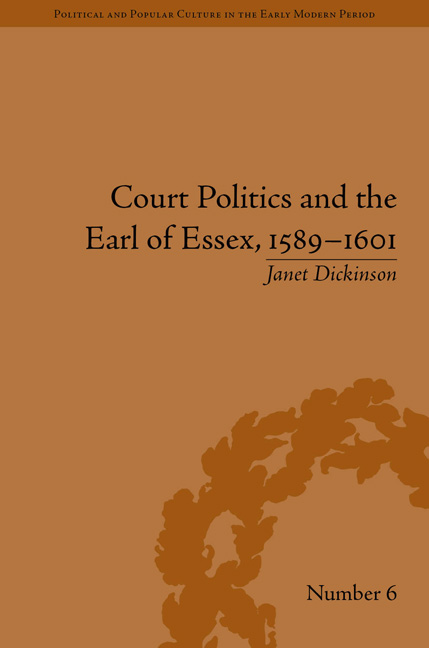Book contents
- Frontmatter
- CONTENTS
- Dedication
- Acknowledgements
- Introduction
- 1 Chivalric Culture and the Earl of Essex
- 2 The Virgin Queen and Her Lovers
- 3 ‘This Late Unhappy Accident’: The Rebellion of 1601
- 4 Faction in the 1590s?
- 5 Essex and Cecil
- 6 Essex and the Essexians
- 7 Elizabeth's Last Decade: Cult or Crisis?
- Notes
- Bibliography
- Index
3 - ‘This Late Unhappy Accident’: The Rebellion of 1601
- Frontmatter
- CONTENTS
- Dedication
- Acknowledgements
- Introduction
- 1 Chivalric Culture and the Earl of Essex
- 2 The Virgin Queen and Her Lovers
- 3 ‘This Late Unhappy Accident’: The Rebellion of 1601
- 4 Faction in the 1590s?
- 5 Essex and Cecil
- 6 Essex and the Essexians
- 7 Elizabeth's Last Decade: Cult or Crisis?
- Notes
- Bibliography
- Index
Summary
By February 1601 the Earl of Essex had been in disgrace for well over a year and his situation was desperate. He was heavily in debt; he was entirely dependent on royal favour, but had received nothing since his precipitate return from Ireland in September 1599. Facing imminent bankruptcy and convinced that his path back to favour and fortune was blocked only by the machinations of his enemies – who he was convinced were influencing the Queen with their evil counsels – over the course of January and early February 1601, Essex summoned his friends and followers to London to decide on his next action. Men gathered at Essex House and tension built; rumours spread to the authorities of impending trouble. Essex was summoned to appear before the Council and explain himself; he pleaded ill health and remained at home. Several of his followers commissioned a special performance of Richard II, ominously featuring a deposition scene. Finally, on the morning of 8 February, a delegation was sent to the earl, comprising Lord Keeper Egerton, the Earl of Worcester, the Comptroller of the Household, Sir William Knollys and Lord Chief Justice Popham. This was a group that can be quite fairly described as sympathetic to Essex – Knollys was his maternal uncle, and had oft en acted as an adviser to the earl.
- Type
- Chapter
- Information
- Court Politics and the Earl of Essex, 1589–1601 , pp. 43 - 64Publisher: Pickering & ChattoFirst published in: 2014

